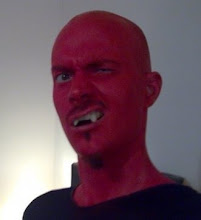Young Adult
Charlize Theron gives a brilliant
performance as Mavis Gary, the unfulfilled belle of a small town, who left for
the big city and a career as a ghost writer years ago, only to find
disappointment and disconnection as she exists on junk food, one night stands
and writer’s block about 10 years after that would stop being fun.
On receiving a round robin email with the
picture of an old flame’s new baby, she decides to go back home to try and get
a little self confidence from those left stuck behind, only to find them more
happy and content than she. This wasn’t how it was supposed to be!
Finding her old schoolmates mainly
underwhelmed by her being back, she tries to get back in with her old flame,
despite his being married and newly a father. In the meantime she meets an old
classmate, Matt (Patton Oswalt) who was crippled by homophobic jocks, despite
his being straight, and they form a disjointed friendship based on the
perceived failings of others.
Her stay at home spirals into a nosedive of
epic proportions as she combusts in front of a large part of the town, but
moves on, still thinking she’s better than them.
There’s a lot of bite in the dialogue from
Diablo Cody’s script, directed again by Jason Reitman after the success of
Juno, and it feels like there’s not a little self-deprecating autobiography
about it.
Despite her overwhelming flaws we still
come to care about Mavis, enabled by Theron’s unflinching portrait of a
self-obsessed but self-deluded depressive.
The Muppet Movie
It seems that Gary‘s (Jason Segel) brother Walter
is essentially a muppet and grows up in awe of the show, feeling out of place
in his all-American small town.
After some to-and-froing with Gary’s
sweetheart Mary (Amy Adams) the trio travel to Hollywood to visit the old
muppet theatre, only to find it under threat by mean old developers. Off they go to
find Kermit and persuade him to put the gang back together for a fundraiser
that will save the theatre.
There are quite a lot of in jokes about the
muppet’s waning fame and a bucket load of musical numbers, but the most
enjoyable scenes are those with the evil developer Chris Cooper and his muppet
henchmen.
Whilst all the goody-goody wholesomeness
overplayed by Segel and Adams is definitely tongue in cheek, it does get a
little cloying.
This is a better muppet movie than the last
few to hit cinemas but still isn’t quite as funny as I wanted it to be, as a
fan growing up with the TV show in the 80s.
We Need To Talk About Kevin
Lyn Ramsey manages to take on a story of
one of the most American of tragedies, the high school massacre, whilst leaving
her unique painterly vision intact.
We’ve had arty versions of this story
before, with Gus Van Sant’s 2003 Elephant, but whereas that imagining of the
events of the real Columbine high school murders created a film whose
interpretation sometimes veered more on the sleepy end of dreamlike, ‘Kevin’ is
more visceral, if almost as light on dialogue.
Ramsey’s approach to the book is to get us
inside Eva’s head through setting a tone, and using Tilda Swinton’s
extraordinary abilities to convey the isolation, anger, frustration and
resentment she feels alongside the occasional burst of joy.
It’s joy that opens the film, but even as
Eva is carried above the crowd at the La Tomatina, the annual tomato-fight near
Valencia, we are introduced to the recurring motif of Eva covered in red.
Moody washes of colour continue to set the
tone as we continue to follow Eva’s pregnancy and the start of motherhood
through flashbacks she has from her current life, what we later learn is a
limbo she endures as her son rots in prison after murdering numerous
classmates.
The scorn and attacks carried out by
townspeople are accepted, begrudgingly, by an Eva who clearly feels somewhat
responsible by the way her son turned out, though there is an anger there too,
a suspicion that he emerged into the world fully formed and resentful of her.
John C. Reilly does well as the father,
Franklin, totally manipulated by his son’s cynical act as the dutiful son, only
when his dad’s around, whilst Ezra Miller and Jasper Newell are brilliant as
the teenage and younger incarnations of Kevin, all malice and sly charm and
convincingly different versions of the same person.
Unlike the book Ramsey’s film doesn’t focus
very much on the massacre itself, instead when those scenes come up it mainly
features outside the school, taking in the reactions of school kids and family,
as well as Eva herself.
The film, like the book, is brave in
depicting the conflicting feelings some mothers feel, rather than the assumed
automatic motherly instincts, and questions how much influence we have in our
children’s development.
The Comedian
Low budget British mumblecore drama about a
32 year old for Sheffield trying to make it as a stand-up comedian whilst
hating his day job in a call center, torn between his feelings for his French
housemate and a young man he recently met on a bus.
Conversations and relationships feel
realistic, with no overly scripted elements, people mumble, pause and talk over
each other in a way which demonstrates writer-director Tom Shkolnik‘s ear for
dialogue.
All the main parts are well played, Edward
Hogg as Ed exuding a rumpled tiredness as he flits through life like a man in
his 20s but ten years on. Nathan (Nathan Stewart-Jarrett from Misfits) is good
as a younger man living an artist’s lifestyle, unwilling to be collateral
damage from Ed’s early/mid-life crisis, and Elisa Lasowski (as flat mate Elisa)
offers a mix of friendship and intimacy that makes it easy to believe when Ed
feels torn and can’t make up his mind.

















